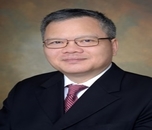
De-chu Christopher Tang
VaxDome LLC, USA
Title: Activation of Protective Innate-Adaptive Immunity Duo for Conferring Rapid-Sustained-Broad Protection of Vaccinees against Pathogens
Biography
Biography: De-chu Christopher Tang
Abstract
We report that intranasal administration of an E1/E3-defective (DE1E3) adenovirus serotype 5 (Ad5)-vectored influenza vaccine could induce seroconversion in human volunteers without appreciable adverse effects, even in subjects with pre-existing Ad5 immunity. Mice and ferrets were well protected against challenge by a lethal dose of an H5N1 avian influenza virus following intranasal instillation of an Ad5 vector encoding hemagglutinin (HA) in a single-dose regimen. Moreover, the DE1E3 Ad5 particle itself without transgene could confer rapid-sustained-broad protection against influenza by inducing an anti-influenza state in a drug-like manner. An Ad5 vector encoding HA thus consolidates drug and vaccine into a single package, which allows the Ad5 backbone to induce protective innate immunity capable of conferring nearly-immediate and prolonged (e.g., 1-47 days) protection as the first wave against influenza; followed by HA-mediated adaptive immunity as the second wave before the innate immunity-associated anti-influenza state declines away.
An Ad5 vector encoding a bioengineered Bacillus anthracis protective antigen (PA) could also confer rapid prophylactic or post-exposure anthrax therapy with synergy to antibiotic treatment in a murine model. Both rabbits and macaques were well protected by an Ad5-PA-vectored nasal anthrax vaccine in a single-dose regimen against inhalational anthrax following challenge with a lethal dose of Bacillus anthracis Ames spores.
Overall, the work conceivably would foster the development of a novel noninvasive drug-vaccine duo platform technology capable of conferring rapid-sustained-broad protection against pathogens with neither the potential to induce drug resistance nor that to trigger harmful systemic inflammation

